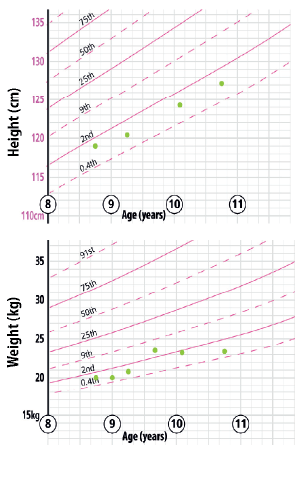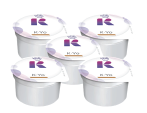Use of K.Yo in the ketogenic diet of a paediatric patient with drug resistant epilepsy | Case Study
Description
A case study highlighting the dual use of K.Yo as an oral supplement to meet the nutritional requirements of the ketogenic diet or as a sole source of nutrition during times of illness and limited oral food intake.
The patient is a 10 year old female diagnosed with generalised epilepsy which presented at 2 years of age.
Relevant history
Due to learning difficulties, patient attends a school for children with special educational needs and has respite support
Relevant medical history
Seizures daily including absences, drop seizures and tonic clonic seizures, resulting in slow progress at school.
Ataxia and can experience periods of drooling and swallowing difficulties (holding food in her mouth for long periods) which may or may not be associated with exacerbations of seizures.
Due to dental damage as a result of head drop seizures the patient was following a soft, mashed diet. She was already seeing a Dietitian at her school for nutrition support advice and was prescribed a daily high energy juice based paediatric supplement drink.
Despite trialling 6 anti-epileptic drugs has continued to have seizures daily. At 8 years and 9 months of age the patient was referred to the ketogenic diet service.
Medications
Ethosuximide, sodium valproate and clobazam
Goals of dietary treatment
To reduce number of seizures and ensure appropriate growth and micronutrient intake.
Relevant biochemistry
All screening bloods for ketogenic diet were normal but highlighted vitamin D deficiency (corrected with a high dose colecalciferol for 6 weeks and then standard supplementation).
Anthropometrics
On referral - 20kg, 119cm (8 years, 9 months)

Estimated energy requirements and ketogenic diet prescription
| Daily energy requirement | 1280kcal |
|---|---|
| Chosen ketogenic ratio | 3:1 |
| Macronutrients | 123g fat 21g protein 21g carbohydrate |
| Daily meal plan | 3 x 426kcal meals (breakfast, lunch & dinner) |
| Macronutrients per meal | 41g fat 7g protein 7g carbohydrate |
| Micronutrients | 1 x 6g sachet Fruitivits |
Education and training
- Parents were provided with and trained on using an electronic ketogenic management programme (EKM).
- Provided with a bank of recipes to get them started; 3 breakfasts and 9 main meals.
20.1kg, no height obtained (9 years)
Managed CKD for 3 months, although parents found it difficult to calculate recipes and diet plans (due to the protein restriction) so, opted to move to the modified ketogenic diet (MKD). Energy requirements were recalculated to 1380kcals/day due to poor intake and slow weight gain.
| Macronutrient | Daily Allowance | g/day or meal | Food choices |
|---|---|---|---|
| Fat | minimum 70% | 110g 3 x meals = 30g 1 x supper = 20g |
11 x 10g fat choices/day |
| Carbohydrate | 20g | 20g (distributed equally throughout the day) | 20 x 1g or 4 x 5g carbohydrate choices (or a combination of both) |
| Protein | Moderate (Normal intake) |
Guidance on food choices was provided, there was no recommendation on protein amount and Mum was advised to spread the fat allowance throughout the day. Food label training was provided.
Speech and Language Assessment
Advised a soft/mashable diet due to dental damage and sometimes she can 'forget' to chew.
20.9kg, 120.4cm (9 years 3 months)
Ketones had been consistently > 3mmol/l and a 50% reduction in seizures, but dropped to 3mmol/l again.
23.6kg, no height obtained - refused (9 years 8 months)
Weight improved and Mum was able to devise meals throughout the day keeping to the dietary restrictions, however found it challenging to include the level of fat required as well as protein foods due to the texture modification. Maintaining ketosis became difficult to achieve with ketones dropping to 1.8 - 2.2mmol/l. The patient’s swallow deteriorated and compliance with Fruitivits reduced to approximately 50% intake. Dietitian prescribed 1-2 pots of K.Yo per day.
| 1-2 x K.Yo = 30 - 60g fat (25 - 50% daily fat requirement) |

23.25kg, 124.2cm (10 years 1 month)
The patient experienced an episode of tonsillitis and as a result Non Convulsive Status Epilepticus. She was reluctant to eat although tolerating K.Yo as well as taking medication and drinking water freely. An illness plan was devised to provide 4-5 pots of K.Yo to meet nutritional requirements.
| 4-5 K.Yo = 120 - 150g fat/day |

This ensured:
✔Energy requirements achieved
✔High fat intake (1200-150g/day ~90% energy intake)
✔Protein requirements met (32 - 40g)
✔Restricted carbohydrate (8 - 10g)
✔Increased vitamin and mineral intake to meet LRNI
✔No weight loss
✔Maintained ketosis (>3mmol/l)
Post illness
As the patient’s condition improved, the intake of K.Yo reduced to 1-2 pots per day as she was able to resume to her normal ketogenic diet.
This case highlighted the difficulty of adhering to the ketogenic diet alongside swallowing difficulties and how K.Yo assisted in overcoming these challenges by providing a palatable, semi solid textured and low volume food. K.Yo was used in 2 ways: 1) as a ready to eat supplement to add fat and variety to such a restricted diet and 2) as a sole source of nutrition during times of poor nutritional intake.


